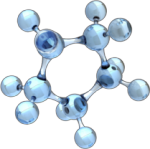Chemistry in the Institute for Single Crystals
From the first day of its foundation the Institution was focused on the chemistry studies in the fields of luminophores and dyes (Prof. Boris Krasovitskiy), design of liquid-crystal composites (Prof. Lidiya Kutulya), raw material synthesis and purification techniques for crystal growth, analytical chemistry and structure studies of functional materials (Prof. Avram Blank).
Here, at SSI ISC, Prof. Boris Krasovitskiy started the synthesis and research of perspective organic luminescent compounds. Prof. Krasovitskiy monograph “Organic luminophores” published in 1972 has received several editions and became all-known the world. Later the scientific interests also involved the search for new functional materials including laser dyes, markers and probes for biomedical studies.
Liquid crystals (LC) were one the main topics as there was developed a number of LC-thermoindicators for industry and domestic use and in the 90’s the study was focused on the bioequivalent detectors of irradiation and converters of light and solar energy.
Analytical chemistry at SSI ISC was conducted with the development of analytical techniques for the determination of trace amounts of impurities in raw materials for growing single crystals and environmental objects.
Division of Functional Materials Chemistry
In 2005, to improve the Chemistry studies at the SSI Institute for Single Crystals, there was established the Division of Functional Materials Chemistry with five research departments as a part of SSI ISC and now consists of the following departments:
- Department of X-ray Diffraction Studies and Quantum Chemistry with
◦ Ukrainian-American Laboratory of Computational Chemistry - Department of Organic and Bioorganic Chemistry
- Department of Luminescent materials and Dyes with
◦ Laboratory of Organic Materials - Department of Analytical Chemistry 5. Laboratory of Technology and Analysis of Drugs
Today our staff consists of 79 researchers including 8 Professors, 46 PhD’s and 10 PhD students.
Main scientific areas of the Division are the following:
Computational Chemistry and Chemical Crystallography. Structure, conformational analysis and intramolecular interactions of organic compounds. Crystal structure and properties of inorganic materials and thin films. Conjugation and hyperconjugation in cyclic systems. Weak intermolecular interactions. Molecular modelling and design.
Organic Chemistry. Theoretical aspects of heterocyclic compounds chemistry. Synthesis, properties and modification of nitrogen-, oxygen- and sulfur-containing heterocycles. Development and study of supramolecular compounds and nano-scale materials. Application of non-classical methods of activation (microwave and ultrasonic irradiation) for chemical synthesis and fundamental studies of the physicochemical aspects of interaction of microwave irradiation with matter.
Inorganic Chemistry. Microwave assisted and classical inorganic synthesis of pure inorganic compounds.
Functional Material Science. Fluorescence-based materials for the life sciences. Probes and labels for biomedical applications. Materials for flow detection. Organic scintillation materials. Organic fluorescent colorants. UV-Vis-NIR steady-state and fluorescence lifetime (FLT) spectroscopy. Composite materials on the base of magnetic nanoparticles and especially designed organic medium.
Analytical Chemistry of functional materials, noble metals, environmental objects, foodstuffs, medicines. X-ray, atomic-emission, atomic-absorption and molecular spectrometry. Express-tests for detection and semi-quantitative analysis of toxic and biologically active substances. Sample preparation. Qualitative and quantitative analysis of organic mixtures with the use of GC-MS, GC and HPLC techniques.
Medicinal and Pharmaceutical Chemistry. Drug design. Molecular docking. Directed synthesis of biologically active compounds and API. Biomolecular studies of chemical compounds. Drug formula development and testing. Pharmacology studies of drugs and their components.
Our international activities include participation in international projects and academic exchange programs with scientific groups worldwide, in particular, Heinrich-Heine-University of Düsseldorf, University of Konstanz, Graz University of Technology, Institute of Analytical Chemistry and Radiochemistry, University of Rostock, University of Toulouse and University of Strasbourg – in Europe, Jackson State University and University of South Florida in USA.

